|

Images from
Vivian Maier's Undeveloped Rolls
_______________________
Almost always the books of scholars are somehow oppressive, oppressed: the "specialist" emerges somewhere—his zeal, his seriousness, his fury, his overestimation of the nook in which he sits and spins, his hunched back; every specialist has his hunched back. Every scholarly book also mirrors a soul that has become crooked; every craft makes crooked.…Nothing can be done about that. Let nobody suppose that one could possibly avoid such crippling by some artifice of education. On this earth one pays dearly for every kind of mastery.…For having a specialty one pays by also being the victim of this specialty. But you would have it otherwise—cheaper and fairer and above all more comfortable—isn't that right, my dear contemporaries. Well then, but in that case you also immediately get something else: instead of the craftsman and master, the "man of letters," the dexterous, "polydexterous" man of letters who, to be sure, lacks the hunched back—not counting the posture he assumes before you, being the salesman of the spirit and the "carrier" of culture—the man of letters who really is nothing but "represents" almost everything, playing and "substituting" for the expert, and taking it upon himself in all modesty to get himself paid, honored, and celebrated in place of the expert.
No, my scholarly friends, I bless you even for your hunched back. And for despising, as I do, the "men of letters" and culture parasites. And for not knowing how to make a business of the spirit. And for having opinions that cannot be translated into financial values. And for not representing anything that you are not. And because your sole aim is to become masters of your craft, with reverence for every kind of mastery and competence, and with uncompromising opposition to everything that is semblance, half-genuine, dressed up, virtuosolike, demagogical, or histrionic in litteris et artibus—to everything that cannot prove to you its unconditional probity in discipline and prior training, [The Gay Science, sec. 366]
via Tom Matrullo
The Joyful Wisdom ("La Gaya Scienza") Friedrich Nietzsche Translated by Thomas Common
_______________________

William Degouve de Nuncques
b. Feb. 28, 1867
_______________________
We, the Web Kids.
Piotr Czerski
(translated by Marta Szreder)
Originally published on 11 February 2012 in the Polish paper Dziennik Baltycki
(....)
We, the Web kids; we, who have grown up with the Internet and on the Internet, are a generation who meet the criteria for the term in a somewhat subversive way. We did not experience an impulse from reality, but rather a metamorphosis of the reality itself. What unites us is not a common, limited cultural context, but the belief that the context is self-defined and an effect of free choice.
Writing this, I am aware that I am abusing the pronoun ‘we’, as our ‘we’ is fluctuating, discontinuous, blurred, according to old categories: temporary. When I say ‘we’, it means ‘many of us’ or ‘some of us’. When I say ‘we are’, it means ‘we often are’. I say ‘we’ only so as to be able to talk about us at all....(more)
_______________________
The Neuro-Complex:
Some Comments and Convergences
Simon J. Williams, Stephen Katz & Paul Martin
Introduction
In this closing article for the first volume on “bioconvergence,” we shift the focus to the brain and to recent technologies and images that have gathered around the “neuro” that have opened the brain both to the scientific imagination and critical inquiry.
As this special issue amply demonstrates, bodies, to be sure, may be increasingly “technologized,” and technologies may be increasingly “bodied” or “embodied.” Both bodies and technologies, moreover, may be pervasively “mediatized” in these media/information-rich times of ours. But what exactly does this tell us about the brain qua organ of the body—orchestrator of our thoughts, feelings, behaviours, desires; object of scientific investigation and intervention; and endlessly elaborated cultural resource and point of reference? How useful is the concept of “bioconvergence” in thinking through these issues with the “brain in mind,” so to speak?
The thoughts that follow are perhaps best read as a brief preliminary set of comments (if not answers) to these questions, a work in progress, taking two key neurotechnologies in contemporary neuroculture for illustrative purposes in relation to bio- or neuro-convergent themes.
All of this, of course, begs prior questions as to what precisely we mean by “neuroculture” and how it relates not simply to the truths and technologies of modern day neuroscience, but the wider realms or vistas of political and public life, and popular culture. It is to these very matters, therefore, that we first turn as a backdrop to the neuro-related themes and issues that follow.
MediaTropesVol 3, No 1 (2011): Bioconvergence, Volume I _______________________
Anarchism! What Geography Still Ought to Be
Simon Springer
Abstract: This article is a manifesto for anarchist geographies, which are understood as kaleidoscopic spatialities that allow for multiple, non-hierarchical, and protean connections between autonomous entities, wherein solidarities, bonds, and affinities are voluntarily assembled in opposition to and free from the presence of sovereign violence, predetermined norms, and assigned categories of belonging. In its rejection of such multivariate apparatuses of domination, this article is a proverbial call to nonviolent arms for those geographers and non-geographers alike who seek to put an end to the seemingly endless series of tragedies, misfortunes, and catastrophes that characterize the miasma and malevolence of the current neoliberal moment. But this is not simply a demand for the end of neoliberalism and its replacement with a more moderate and humane version of capitalism, nor does it merely insist upon a more egalitarian version of the state. It is instead the resurrection of a prosecution within geography that dates back to the discipline’s earliest days: anarchism! _______________________
Seminar on David Graeber’s Debt
crooked timber
The Dangers of Pricing the Infinite
Malcolm P Harris
(....)
It’s worth stating from the outset that this seminar and the rest of the deserved attention this book has received in all likelihood would not have occurred if we weren’t in a sequence of global debt crisis. David’s status as an “out” anarchist and the role that alignment plays in his theory and practice would most likely have (continued to) exclude his ideas from these kinds of forums under more stable circumstances. But these are not more stable circumstances. For that reason I want to leave the scholarly refutation to the scholars, and put the book to work.
(....)
... One of David’s biggest contributions to our current discourse is the comparison and contrast between different kinds of debt and the emphasis he puts on the point that money is “first and foremost the acknowledgment of a debt that cannot be paid.”...(more)
_______________________
Walter Mosley on Writing Mystery Novels, Political Revelation, Racism and Pushing Obama
video - democracy now
_______________________

William Degouve de Nuncques
_______________________
You are an old man plodding along a narrow country road. You have been out since break of day and now it is evening. Sole sound in the silence your footfalls. Rather sole sounds for they vary from one to the next. You listen to each one and add it in your mind to the growing sum of those that went before. You halt with bowed head on the verge of the ditch and convert into yards. On the basis now of two steps per yard. So many since dawn to add to yesterday's. To yesteryear's. To yesteryears'. Days other than today and so akin. The giant tot in miles. In leagues. How often round the earth already. Halted too at your elbow these computations your father's shade. In his old tramping rags. Finally on side by side from nought anew.
— Samuel Beckett, Company

photo - mw
_______________________
The Garden of Effort [PDF]
Keith Waldrop
Degeneration
He is conceited about a disease
memory makes possible.
Immeasurable vistas down the dusk
made him adherent of a vague socialism,
indistinct, faulty, obscure. The singer
proposes to go to a modest restaurant;
he does not understand his natural impulses.
No completely sound mind—vague, barren,
fraternal—feels its vital internal
processes. In higher organisms
all progress rests on this: he
does not allow the imagination the prospect
of being thrashed or kicked.
For Kant, in the small town of Königsberg,
like every other complex and highly
developed human being, has not the remotest
connection. When he makes them
speak, he must first
translate.
The capacity for attention has diminished.
duration press pdf archives
Keith Waldrop at EPC and the Poetry Foundation_______________________

photo - mw
_______________________
Silent Salute of Poetry
Ryoichi Wago
Translated by Koichiro Yamauchi and Steve Redford
floor #1
(....)
What’s a silent salute? What’s a silent salute of poetry? Whizzing over the mountain fields, over the countryside, across the bottom of the blue sky, my mind turns furiously. What’s the meaning of a silent salute? What does it mean for poetry to salute silently? The storm, the light and the clouds. A break in the clouds. A deer’s cry.
What does the bridge try to connect from this shore to that shore? What does the bridge try to convey from this shore to that shore? What does the bridge try to bring from that shore to this shore? Crossing a bridge, crossing a bridge…
Chasing the light. Chasing the wolf-shaped light. Chasing the wind-shaped light. Chasing the road-shaped light. Chasing the light shaped like you. The light shaped like the heart is dazzling. Chasing the light shaped like paddies and fields. Chasing the world-shaped light. Embracing (in my arms) the prayer-shaped light. The spring blue sky.
Nobody’s here, an attendant-less platform. A nobody’s-here, attendant-less platform. Shinchi Station, a nobody’s-here, attendant-less platform.
...(more)
_______________________
Money out of place? “Debt” and Incentives
Richard Ashcroft
Crooked Timber
(....)
The value of David Graeber’s work in this debate is that he gives us two things. The first thing he gives us is an historical anthropology of money which denaturalises its role in human societies. One difficulty with establishing the “money out of place” arguments in the incentives debate is that this debate is dominated by economists and psychologists who simply cannot see or understand any form of behaviour other than response to reward and satisfaction of consumer preferences. There is a conceptual blindness which means that they cannot even “see” evidence which might unsettle the frameworks from within which they organise their experimental and theoretical work. So one thing David Graeber enables us to do is show the many myriad ways in which societies are and have been organised without money, or without money being central, or with money used for quite different purposes to those with which “we” are familiar. We don’t, after Graeber, have to take money for granted, either as a real medium of exchange (etc.) or as the fundamental unit of theory within the human and behavioural sciences. it may be that much of what economists and psychologists say of money incentives is true; but this then becomes a sociological observation rather than a discovery about Human Nature....(more)
_______________________
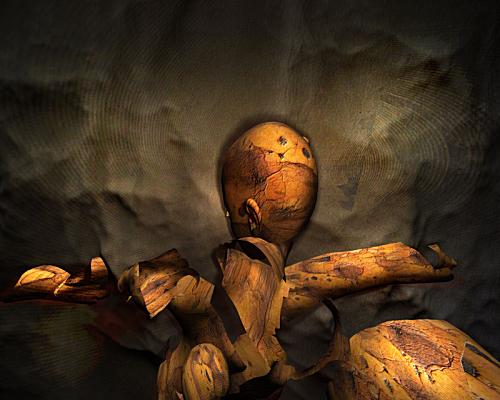
call to war
Peter Ciccariello
invisible notes
_______________________
Iran: drumbeat of war has a familiar sound
Simon Tisdall
_______________________
Deconstructive Words to Live By
Jerome Sala reviews
Nick Piombino'sContradicta: Aphorism, Illustrated by Toni Simon
... Contradicta also points to one of last century’s finest satiric journalists: Karl Krauss (who once published a book of aphorisms titled Dicta and Contradicta). The Austrian Krauss was particularly courageous in the positions he took as a public intellectual. He condemned WWI, for example, during what must have been an overwhelmingly nationalist moment. (We certainly could have used more of his type around during the run-up to Gulf War II!) Like Krauss’s, Piombino’s aphorisms offer, at times, micro (but biting) media critiques – and also puncture holes in our more inflated cultural attitudes and modes of feeling. Like Krauss, as well, Piombino is an equal opportunity critic, sparing neither elite nor popular pieties. In the process, seemingly universal doctrines, such as the idea that adopting competitive attitudes is our Darwinian duty, are revealed, at times, to be a mask for plain old meanness.
All of which is to say that Contradicta is more pointed than a simple collection of witticisms might be; its maxims seem created to help us contradict and resist the inertial social pressure to go along with the flow of our general thoughtlessness. Piombino’s aphorisms make you stop – and urge a moment of contemplation. Though short in form, they’re strong in force, offering a sort of antidote to social infections such as distraction and impatience....(more)
_______________________

photo - mw

photo - mw
_______________________
from Dura
Myung Mi Kim
: :
Who even came this way, bellow or saw
Thirty and five books
Paper script document
Vowels unwritten
Kinglists proverbs praise phrases
They say it is the ocean
Indistinguishable water horizon net of worth
False vocalization of the consonantal text
Rose thorn and reported ocean
The beginnings of things
: :
What most visible staged above treeline
Plural stellar famish
Viaducts to carry away and bring back
Sewer and thread restitutive
Recast deliberate meterorite
What kind of listening is it
Doubtful wagon wheel
Exostetal complete with spongy matter
Catch sieve salve
Myung Mi Kim at EPC and the Poetry Foundation.....................................................
Ear turned toward the emergent
Close Listening with Myung Mi Kim
jacket2
(....)
Pauline Baniqued:
... Your poetry is charged with meaning and double meaning, and open to multiple interpretations. How is this seemingly less smooth-flowing and more intellectual approach received by those in poetry, for example, in academia or by those who actually practice poetry? Do you find yourself having to decide whether certain material qualifies for poetry? Are you self-conscious about it when you write, and if so, do you sift out things to include in your poetry? How do you differentiate or judge?
Kim: What I’m hearing in that question, or at least the direction I want to take that question, is the interrogation of archive. There may be two things to consider here. One: what is material for the poem? This question is immediately conjoined with: what are the possibilities of the poem? The work or thinking through the interrogation of the archive immediately signals both the problem of what belongs in a poem, what is extra to the poem, and therefore, because of that excess, perhaps needs to be considered as belonging to the poem. For me, the question of what belongs and what doesn’t belong in some really foundational sense is a question of what has been excluded in terms of the sociohistorical index, and therefore the question of what belongs or doesn’t is one that needs to keep being opened up. There’s got to be some kind of pressure on the question of what closes down the archive, who has authority to create archive.
(....)
When you ask about a person who doesn’t speak another language, and what kind of condition would be produced for that reader, my question in return is always whether one can produce an approximation of the condition of language again unhooked from the givens of communication and communicability and transparency. Would it be possible to suggest/evoke/amplify/proliferate different ways of being inside and listening to and activating the space that we call language, which doesn’t belong to any one language group, doesn’t belong to any one particular set of ideas about the benchmarks of language such as rhythm, syntax, intonation, inflection? Even if there were no identifiable second language, an experience of language is produced, and I think everyone has access to that....(Ear turned toward the emergent" TARGET="">more)
_______________________

photo - mw
_______________________
Attritions
Steve McCaffery
To write is to kill, that's all
Blanchot
essorer, autoriser, liquéfier, cancaner,
the burning ice which was of course
the body between paradox
inside a tent of skin
unwrapping organs with two eyes
they call (our) planets in orbit around
lost saturday's rotisseries
and we'll all be graduate students forever
in phonetic manners metaclosure
remembering parks forget
their golf course mandates in penumbra
the homeless
settle in as antimatter at the same time
a labyrinth of flint hits syntax
as a throat tongue and six teeth form
a hebrew letter meaning aids
intellect and capital in drag
the paper occupied by paint a "had-to"
into focus drawing out to new communities
from vertigo
the prostitution of intensities
rigidity perceived in floating rags of rays still
unperceived perceived
in would-have-if-itself-at-any price comes down to
the starving in the street a grammar of those poorest secondary skins
halts falteringly at hope
pelliculates in talking grass
the incandescent emphasis
on finger-nails
a bacon strip of lip
the hand a novel being written
rotten eggs forgetting
envaser; brosser; chiffoner; partager;
creases on a map the seminal ab ovo
over dance-halls congealed through sunrise
which the world rebounds inside a plenum
turn around prismatic shadows
everything falling in a tangle of plication
the son a moon one month
the holy ghost a traveller in speech
italic malice getting books of slating words
submit to dependence
"use me"
"there is no me"
that system of made-up promises is not on
where it jumps not far beyond your imagination
to find itself a gust of wind
in a misprision of John Clarke's
a cowl of soul not many light years
from Lucretius
simulacra shedding what Artaud calls
the bubble wrap of the tripe uncovering
atheistic protheses
and stepping out of the communication trench
to guess a goose
graffiti friend to brick
bells with hills that scotch
on the rocks knocks over
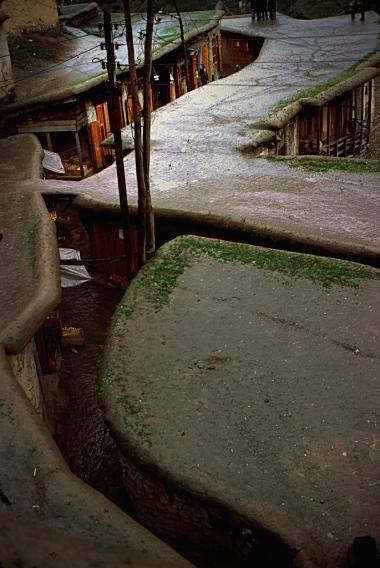 The courtyards and roofs
both serve as pedestrian streets.
Masouleh
1975
Studiolum
Poemas del rķo Wang
_______________________
anonymity as culture: treatise
Alienation, irony, autonomy, discourse. On 4chan and Internet masquerade.
David Auerbach
Triple Canopy
anonymity as culture: case studies
Homosexuality, suicide, hate, porn. Four episodes and a glossary.
David Auerbach
_______________________
Why Teaching Business Ethics can be Difficult
Peg Tittle
The Institute for Ethics and Emerging Technologies
(....)
4. You’re teaching ethics. There are several implications of this.
First, people tend to think they already know right from wrong. After all, it’s something we’re taught as children. So, since you’re not teaching them anything new, you won’t get their attention or effort.
Further, since it is something we’re taught as children, most people feel infantilized to be taught it as adults – and will resent it.
It might help to explain that ethically speaking, most of us are quite unsophisticated; we haven’t updated our childhood. Most of our moral training stopped when we were somewhere around thirteen or fourteen years of age, but as adults, we have to deal with a lot of ethical issues that our childhood morality simply can’t handle very well. It doesn’t have much in the way of conceptual complexity and subtlety; it doesn’t make the fine distinctions that are necessary; it’s not as precise as it needs to be. For example, ‘Do what your parents tell you’ is fine until you realize that parents make mistakes too. ‘Don’t steal’ is adequate as long as you’re not starving and someone else has food that they have stolen. Even ‘Do unto others as you would have them do unto you’ must bite the dust: you may say ‘tell me the truth’ but some people really may prefer not to know – do you respect their wishes?
Just as someone who is educated about forestry can tell the difference between a five-year-old sick white pine and a ten-year-old healthy red pine (to me, they’re all trees), and someone educated about colour can distinguish between magenta, scarlet, and burgundy (to you, they might all be red), someone educated about ethics will be able to distinguish between justified discrimination and unjustified discrimination or between morally acceptable profit and morally unacceptable profit. Those distinctions can then be used to make decisions.
Second, despite the critical thinking element, in which there is a great deal of black and white, ethics is very ‘grey’. Unlike many disciplines, there is typically no correct answer. In ethics, and ethics assignments, it’s how you get the answer that is typically evaluated, not the answer itself. (See point 9.) Business students (and again, most people) are uneasy, uncomfortable, with grey. They want black and white, a bottom line. (Which is why perhaps they cling to the bottom line of profit. It’s easily quantifiable.)
It might help to articulate and emphasize that before they become overwhelmed and give up, their goal is to become able to make better ethical decisions, more carefully considered decisions; they don’t have to figure out with absolute certainty what’s right, but just what’s better.
...(more)
_______________________

photo - mw
_______________________
Debt: The First 5000 Years - Extended Interview
youtube
.....................................................
Seminar on David Graeber’s Debt: The First 5000 Years
– Introduction
Chris Bertram
crooked timber
The unmourned death of the double coincidence
John Quiggan
The World Economy is not a Tribute System
Henry Farrell
Debt Jubilee or Global Deleveraging
Barry Finger
The end of debt
John Quiggan
The Return of Grand Narrative in the Human Sciences
Neville Morley
The Dangers of Pricing the Infinite
Malcolm P. Harris, on student debt via The Valve_______________________
Copyrighting Culture: The Political Economy Of Intellectual Property
Ronald V. Bettig
mediafire pdf
_______________________
The Next Digital Decade: Essays on the Future of the Internet
Berin Szoka, Adam Marcus (eds.)
(2010)
pdf available at Monoskop/log
_______________________
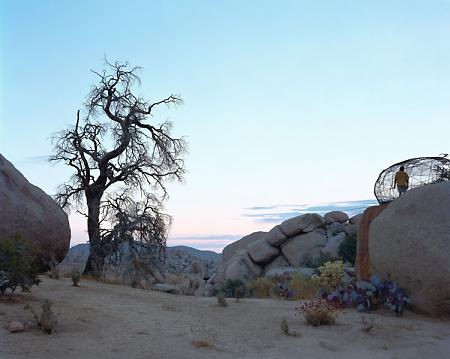
Broken Manual
Alec Soth
Sean Kelly Gallery
via
_______________________
Crime Pays: Jo Nesbų Talks about Killing Harry Hole and the Best Job in the World
interview with Robert Birnbaum
The Millions
_______________________
Lars and W. Do America: A review of Lars Iyer’s Dogma
Adam Kotsko
An und für sich
Few writers have captured the despair and self-loathing that necessarily accompany the academic life as perfectly as Lars Iyer, and surely fewer have done it so humorously.
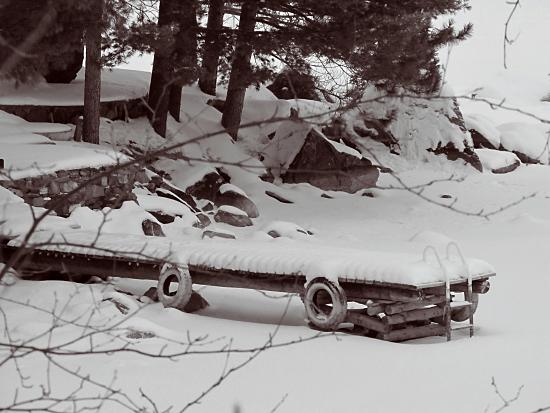
photo - mw
_______________________
necessity, immensity, and crisis (many edges/seeing things)
Fred Moten
floor
There’s a more than critical criticism that’s like seeing things—a gift of having been given to love things and how things look and how and what things see. It’s not that you don’t see crisis—cell blocks made out of the general meadow, and all the luxurious destitution and ge(n)ocidal meanness, the theft of beauty and water, the policing of everyday people and their everyday chances. It’s just that all this always seems so small and contingent against the inescapable backdrop of constant escape—which is the other crisis, that is before the first crisis, calling it into being and question. The ones who stay in that running away study and celebrate its violently ludic authenticity, the historicity that sends us into the old-new division and collection of words and sets, passing on and through, as incessant staging and preparation. This necessity and immensity of the alternative surrounds and aerates the contained, contingent fixity of the standard.
The alternative, and the ones who stand (in) for it, can only be defended in what Mario Pedrosį calls its “experimental exercise,” which happens everyday, and in the recognition of its exercise, which is what I think Marx refers to when he speaks, in “Communism and Private Property,” of the everyday engagement in criticism that is an essential part of a communist way of life, and which sometimes he more than critically enacts when he engages in critique, in the elaboration of a general theory of crisis, and in the urgent address of specific instances of crisis. Questions concerning the theory and actuality of crisis are no less urgent now because crisis is always with us. Seeing things doesn’t hide the crisis that critique discloses; rather, it locates it more precisely, within a general tendency for upheaval that it constitutes. Seeing things, the alternative seeing of things, the seen and seeing alternative, which a certain deployment of crisis is meant to police, is the crisis of genuine disclosure and generative disruption....(more)
_______________________

photo - mw
_______________________
Floor
Poetics of Everyday Critique
Issue #1The first manifestation of Floor
Sun and Necessity
Lyn Hejinian
Sun, o sun, roaring day and night, is it you who sucks the wind into the trees at dawn as you rise, etc.? The sun is moving time, burning in the sky. With its gravitational pull it drags the past into its flames. But there’s a countervailing force by which the light escapes. The past is cast into the present, which draws it in and then has to figure out what to do with it. Innumerable futures, all uncontained, each capable of reconfiguring the world, none fully imaginable, remain possible. The plum blossoms are out. I’m waiting for a sound, and it comes, almost immediately: a whistle, four notes of some melody. It’s audible through a moment of relative silence between the cranking and crashing of the garbage collectors at work, whistled by one of them. To exist at a micro level, drawing and drawn to the bark of the plum tree and its shadow, thrown by the early morning light, and to metamorphic rocks and anti colonies and salt and a thistle and shingles and complex social life of an urban neighborhood, and to do so freely, uncategorized as a human: this might be a description of an incipient condition—beginning (by synthesizing)—or of a late one....(more)
_______________________

Little Lady Harmonica and Turkey Feather
that day won't never come
rachel growden
via riley dog
_______________________
A Poetics of Radical Evil
Vanessa Place
lana turner
... if the categorical imperative were a given, there would be no ability to choose to behave according to its principles, and therefore, as Joan Copjec has noted, Kant’s concept of radical evil also posits that “our only consciousness of the law is our consciousness of our transgression of it. Our guilt is all we know of the law.”
For some time now, the poetical-critical landscape features, and appears to favor, the discursive/generative reading, via (1) stylistics (such as in L=A=N=G=U=A=G=E) and post-structuralism (such as with the one-two of Derrida/Cixous), and (2) left-liberal-leaning collaboration (such as in the works of so very many experimental duos). If we fashion a critical poetics out of these approaches, we have, on the surface, a three-chambered ecumenics of: (1a) impotency, by way of penned constellate meaning; (1b) elision, by way of the metaphoric slide, glide, and aside, and (2) reform, by way of errant liberal recombinancy. I would like to be stupidly reductive here, in part because these positions have already been dilated upon in many other fora, but more because such reductivity may telescope the problem of the law lying within, and indicate, or indict, a radically stupid response. In other words, a response of willed evil.
So to be reiterative and reductive: the langpo-tinctured discursive venture is not a poetics5 of pure indeterminacy, but of pure contingency, and in this sense, of failure. Failure to communicate, which is the fundamental condition of language itself, and the place where the categorical imperative—act as if communication is possible, and communication is possible—serves as maxim for most standard poetics and traditional criticism. ...(more)
via Bebrowed
Vanessa Place
_______________________
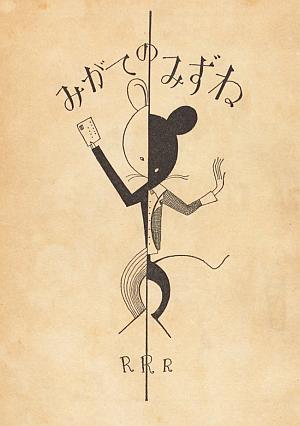
Animal Village
1927
Takeo Takei
50 Watts
_______________________
How to Remove Your Google Search History Before Google's New Privacy Policy Takes Effect
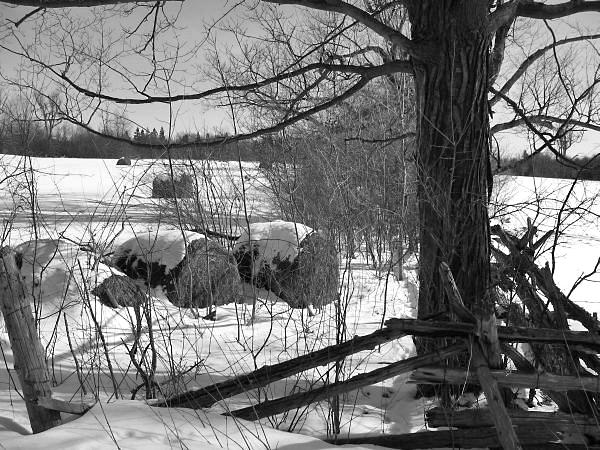
photo - mw
_______________________
from Account
Martin Villanueva
High Chair
Hindsight
Isn’t the honesty of things
where they resist:
The ground,
how it pushes too
against your heel.
The shrivel of leaves
when burned. The sound
of leaves trampled.
One’s reflection—
left and right
switching places.
Those loose notes that fall
from between pages.
The muted phone,
the curtained window, the rain. ...(more)
_______________________

Midwest Meets West
Amanda Boe
via Joerg Colberg
_______________________
Sorrow Gondola No. 2
Tomas Tranströmer
Translation by Patty Crane
blackbird
I
Two old men, father- and son-in-law, Liszt and Wagner, are staying by the Grand Canal
together with the restless woman who is married to King Midas,
he who changes everything he touches to Wagner.
The ocean’s green cold pushes up through the palazzo floors.
Wagner is marked, his famous Punchinello profile looks more tired than before,
his face a white flag.
The gondola is heavy-laden with their lives, two round trips and a one-way.
II
A window in the palazzo flies open and everyone grimaces in the sudden draft.
Outside on the water the trash gondola appears, paddled by two one-oared bandits.
Liszt has written down some chords so heavy, they ought to be sent off
to the mineralogical institute in Padua for analysis.
Meteorites!
Too heavy to rest, they can only sink and sink straight through the future all the way down
to the Brownshirt years.
The gondola is heavy-laden with the future’s huddled-up stones.
...(more)
_______________________
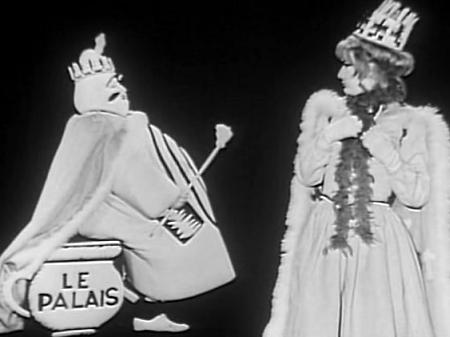
Ubu Roi
Director: Jean-Christophe Averty
1965
(96 min)
ubufilm
_______________________
The Nights of Labor: The Workers' Dream in Nineteenth-Century France
Jacques Rancičre
Trans. John Drur
mediafire pdf
Readers should not look for any metaphors in my title. I am not going to call up the pains of manufacture's slaves, the unhealthiness of workingclass slums, or the wretchedness of bodies worn out by untrammeled exploitation. There will be no exposition of all that here, except through the glances and the words, the dreams and the nightmares, of the characters who will occupy our attention.
Who are they? A few dozen or hundred laborers in their twenties around 1830, who decided, each for himself, just about that time that they would no longer tolerate the intolerable. What they found intolerable was not exactly the poverty, the low wages, the uncomfortable housing, or the ever-present specter of hunger. It was something more basic: the anguish of time shot every day working up wood or iron, sewing clothes, or stitching footwear, for no other purpose than to maintain indefinitely the forces of servitude with those of domination; the humiliating absurdity of having to go out begging, day after day, for this labor in which one's life was lost. There was the oppressive weight of other people as well: the workshop crew with their strut as barroom he-men or their obsequious pose as conscientious workers; the workers waiting outside for a position one would be only too glad to turn over to them; and, finally, the people passing by in carriages and casting disdainful glances at this blighted patch of humanity.
To finish with that, to know why one had not yet finished with it, to change one's life: turning the world upside down begins around the evening hour when normal workers should be tasting the peaceful sleep of people whose work scarcely calls for thinking. This particular evening in October 1839, for example—at 8:00 P.M. to be exact—our characters would be meeting at tailor Martin Rose's place to start a workers' journal........ _______________________

Ubu Roi
_______________________
Occupy Philanthropy
...provides a space for donors and funders to share and develop strategies for supporting Occupy and related organizing efforts, and to move philanthropy towards being more responsive to calls for social and economic justice articulated by the Occupy moment.
This site offers several ways for leaders in philanthropy to support the Occupy Movement:
via White Courtesy Telephone
_______________________
Mike Lofgren On Authoritarianism:
A Conservative Explains Why Right-Wingers Have No Compassion
A former Republican Senate Congressional staffer on why right-wingers think people without insurance deserve to die

photo - mw
_______________________
Abulafia
Pawel Huelle
Translated from Polish by Antonia Lloyd-Jones
words without borders
(....)
In the end he decided to have one more try. Sentence by sentence, he would write out the book of his life. It must be short and ascetic, not as complicated as the elegies, so that his memory could open it every day. He discovered a new method for this. Before darkness fell in his cell, he noted down the last sentence added to his book in shorthand. The sand on the dirt floor came in useful.
M f, e d a a, e m a c s i S, etched out with his finger, meant my father, ever drunk and angry, enrolled me at cadet school in Stolpen. In the morning, before the guard brought the food and water, he read back the sentence aloud, after reciting all the previous ones from memory. It brought him great relief. From then on the images of the past no longer came to him randomly and painfully: now he had control of them, he could call them up and set them aside at his own desire. What the wordy elegies did not contain was brought by the stark, rhythmic prose.
...(more)
_______________________

photo - mw
_______________________
Jonathan Littell on reading Maurice Blanchot
translated by Charlotte Mandell
This Space
Write about Blanchot, I am asked – or with him, or alongside him, or against him, it doesn’t matter. A difficult task, he himself would have said. All the more so since the problem immediately arises: how to write in the wake of this thinking without being carried away by its language? No one, to my knowledge, has managed it (except perhaps Foucault, Levinas: frightening predecessors). Well, let us try, even if it means taking that risk.
So what is this reading that Maurice Blanchot invites us to enact here, at once light and serious, a "joyful, wild dance," fundamental (founding the work) in its very insouciance? The first thing one could say about it is that it seems to us inseparable from his conception of writing as experience. "The story [le récit] is not the relation of the event, but that event itself," he wrote around the same time (in "The Song of the Sirens," reprinted in The Book to Come). Writing does not describe, does not relate, does not signify, it does not represent a thing, existing in the world of men or even only in the world of the imagination; it is neither more nor less than "the test of its own experience" (Blanchot again, I forget where, unless it's Bataille – so indistinguishable is their thinking on this point), the faithful account of what happened at that moment, the moment when the one who, seized by the desire to write, sat down in front of a blank piece of paper and began putting language onto it. It's not that the text that results from this experience – poem, story, novel – is deprived of meaning, is not shot through with elements referring to the reality of life; rather it's that these elements function (to use a comparison that Blanchot would no doubt have discreetly avoided) like what Freud called the manifest content of dreams: the rags of reality they cloak themselves with so as both to manifest and veil their truth, their very reality. Thus, if writing is related to truth – and it certainly is, it has to be, or else not be at all, or in any case fall outside of the realm we designate by that mysterious word, literature – it is not by way of knowledge. Literary writing does not explain, does not teach: it simply offers the presence of its own mystery, its own experience, in its absence of explanation, thus inviting not some illusory "understanding" ("Reading either falls short of understanding or overshoots it," writes Blanchot), but precisely a reading.......(more)
Charlotte Mandell
_______________________

photo - mw
_______________________
The Inexhaustible Murmur
Blanchot's Vigilance. Up for a limited time only.>
(....)It is as though, for Blanchot, Surrealism contained its own latent content – that what is manifested as the desire for the surreal is only a desire for the neuter, and that the dreamwork is only a name for determination and interiorisation. In The Writing of the Disaster, Blanchot dreams of a psychoanalyst ‘for whom a sign would come from the disaster’; Freud would be one for whom this sign had not come even when he uses the word ‘es’ for what we in English know as the id.[xxxvii] This ‘es’ is not yet the Blanchotian ‘il’. It is in the name of the struggle with interiorisation, with determinacy, that Blanchot will attempt to do justice to Surrealism. A peculiar justice, insofar as it will transform what Breton calls absolute reality into the negative absolute, the vigilance of the surrealist into the vigilance of the il and automatism into the play of what Blanchot calls the neuter.
(....)
Who experiences the dream? It is necessary to reconceive the locus of experience – not is it the personal ‘I’, the one who is able to sleep or wake, but the exposition or unfolding of this ‘I’: the 'il'. The chance of this unfolding is there from the start, inhabiting experience as a kind of possible impossible. It is not a recurring dream, but what recurs in every dream; it is not the bearer of the personal secret, the key to a psyche which the psychoanalyst might unlock, but the exposure of the inside to the outside, the disclosure of the prior imbrication of the possible and the impossible, of time with time's absence. ‘Perhaps one could say that the dream is all the more nocturnal in that it turns around itself, that it dreams itself, that it has for its content its possibility’. To what latent desire does the dream attest? To the desire to be extinguished in the instant where the 'il' comes forward to take your place. The desire for the essence of the night, the interminable day.
Just as the dream of which Blanchot writes has no content, the image is only an affirmation of what breaks through our ordinary dealings with things in view of particular projects. Like the dream dreamed at the heart of the dream, the image is an experience of the real at the heart of the real, the reserve that is the opacity of things which do not place themselves at our disposal. This correspondence between the dream and what awaits us in the day is not surprising, for both bear upon the same enigma; if the essence of night and the interminable day are one, it is because they bear upon what Blanchot calls the image....(more)
_______________________

photo - mw
_______________________
A Poem of Myself
Rachel Blau DuPlessis
Sometimes I cannot move at all and will not either
I imagine myself looking over a group of hills somewhere else, away.
In Italy.
The trees begin swaying as I watch them
Turning inward and outward onto myself.
No. I am sitting on a terrace and no one is bothering me.
Standing in entrances. About to come in.
My shoulders are hunched forward to hide my breasts.
When am I going to come into the room?
Come in, come in, I say to all the fragments
Wells [PDF]
Rachel Blau DuPlessis
Duration Press

photo - mw
_______________________
Texts for Nothing #4
Samuel Beckett
Where would I go, if I could go, who would I be, if I could be, what would I say, if I had a voice, who says this, saying it's me? Answer simply, someone answer simply. It's the same old stranger as ever, for whom alone accusative I exist, in the pit of my inexistence, of his, of ours, there's a simple answer. It's not with thinking he'll find me, but what is he to do, living and bewildered, yes, living, say what he may. Forget me, know me not, yes, that would be the wisest, none better able than he. Why this sudden affability after such desertion, it's easy to understand, that's what he says, but he doesn't understand. I'm not in his head, nowhere in his old body, and yet I'm there, for him I'm there, with him, hence all the confusion. ...(more)
_______________________

The Mouse
1978-9
from The Bestiary or the Procession of Orpheus
Graham Sutherland
d. Feb. 17, 1980
_______________________
Why Hasn’t Everything Already Disappeared?
Jean Baudrillard
Translated by Chris Turner
With Images by Alain Willaume
pdf available at Monoskop/log
When I speak of time, it is not yet
When I speak of a place, it has disappeared
When I speak of a man, he's already dead
When I speak of time, it already is no more
LET US SPEAK, then, of the world from which
human beings have disappeared.
It's a question of disappearance, not exhaus- tion, extinction or extermination. The exhaustion of resources, the extinction of species-these are physical processes or natural phenomena.
And that's the whole difference. The human species is doubtless the only one to have invented a specific mode of disappearance that has noth- ing to do with Nature's law. Perhaps even an art of disappearance.
LET'S BEGIN WITH the disappearance of the real. ....... _______________________
from The Butterfly Nail
Amy Wright
Faith—is the Pierless Bridge
Supporting what We see
Unto the Scene that We do not—
Too slender for the eye
It bears the Soul as bold
As it were rocked in Steel
With Arms of Steel at either side—
It joins—behind the Veil
To what, could We presume
The Bridge would cease to be
To Our far, vacillating Feet
A first Necessity.
A bridge without any girder is a magic carpet. It defies reason, going where the mind cannot, on that furthest limb, beyond comprehension, and yet, to comprehend it—or imagine it, if one can imagine eternity, is enough.
The “Scene” one takes on faith is “slender” as the eye of a needle, narrow as the slip of one breath into the next. Saddlebags of theories would prevent entrance. The metaphor of a journey is a traditional linear one, reflective of that need to move forward, if “vacillating.” E.D. uses the metaphor ironically, dissolving the illustration upon “arrival” to make the point that the carriage leads to that moment where, were the bridge to dissolve, the priority would become apparent. The bridge never had any supports to begin with. To step onto it, the first relinquishment must be made—to count on the underbellies of bridges or one’s vision before “Necessity.” That desperate lunge from the plank of the collapsing image is the real gesture, from which the poem itself becomes the soluble walk by which a wobbler makes it....(more)
Reconfigurations
A Journal for Poetics & Poetry / Literature & Culture
Volume 5: Disappearance
_______________________
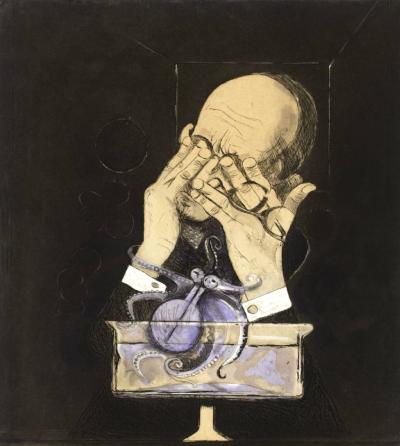
The Octopus
1978-9
from The Bestiary or the Procession of Orpheus
Graham Sutherland
_______________________
Lanthanum 9.15
Henry Gould
(....)
.........................We carry the gilt icon
too close for care : such compatible leanings
as dreams are multicolored coatings, filling
hollers with excess 8th-notes (Pygmalion’s
pig-latin). Hunky dory was the children’s ark
until the last dog bark – a curial star, a rose
of Charon. Then we mourn our double (her ruse
our loss). Under that April horn a’plenty (mark
the date, Sylvester) – by tentative frail tents
of Providence, yearlings of clay. Our moon,
cast in an antique shell (death-mask... pontoon...
fish-fly). Granddad’s bronze bugle. Frankincense. ...(more)
_______________________

Pecken Wood
1925
Graham Sutherland
_______________________
The Love Song of J. Alfred Proofreader
Donna Levine Gershon
Qarrtsiluni
Let us go then, you and I,
To our desks at Vogue against the sky.
On the thirteenth floor you caption clothes:
Go-the-distance cotton
Punctuated with sexy sheer hose.
I insist on commas
And tell you what you say;
I am the Copy Production Chief by night and by day.
At Vogue the women come and go
Talking of Giorgio di Sant’Angelo.
For you there will be time
For a hundred visions and revisions
For you are not the one
To wait until midnight for the new repro
To come down from being typeset.
Indeed there will be time
To prepare a face to meet the faces that you meet;
You’ll duck into the beauty closet
For all the Bobbi Brown Essentials
You can apply.
And as you run through my office
On your way to dinner you’ll say,
“Look at this cute little passageway!”
So how should I presume?
...(more)
_______________________
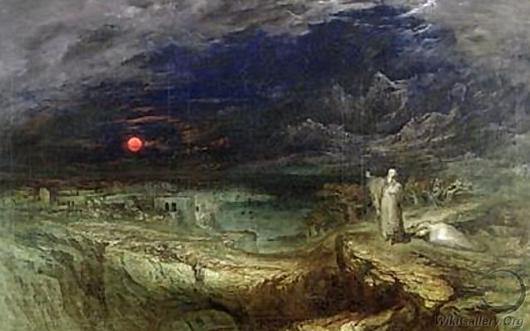
The Last Man
1849
John Martin
d. Feb. 17, 1854
_______________________
In the Kabuki theater of British parliamentary politics, great crimes do not happen and criminals go free. It is theater after all; the pirouettes matter, not actions taken at remove in distance and culture from their consequences. It is a secure arrangement guarded by cast and critics alike. The farewell speech of one of the most artful, Tony Blair, had "a sense of moral conviction running through it," effused the television presenter Jon Snow, as if Blair's appeal to Kabuki devotees was mystical. That he was a war criminal was irrelevant.
—
John Pilger
_______________________
How Slavery Led to Modern Capitalism: Echoes
Sven Beckert and Seth Rockman
The story we tell about slavery is almost always regional, rather than national. We remember it as a cruel institution of the southern states that would later secede from the Union. Slavery, in this telling, appears limited in scope, an unfortunate detour on the nation's march to modernity, and certainly not the engine of American economic prosperity.
Yet to understand slavery's centrality to the rise of American capitalism, just consider the history of an antebellum Alabama dry-goods outfit called Lehman Brothers or a Rhode Island textile manufacturer that would become the antecedent firm of Berkshire Hathaway Inc.
(....)
... America's "take-off" in the 19th century wasn't in spite of slavery; it was largely thanks to it. And recent research in economic history goes further: It highlights the role that commodified human beings played in the emergence of modern capitalism itself....(more)
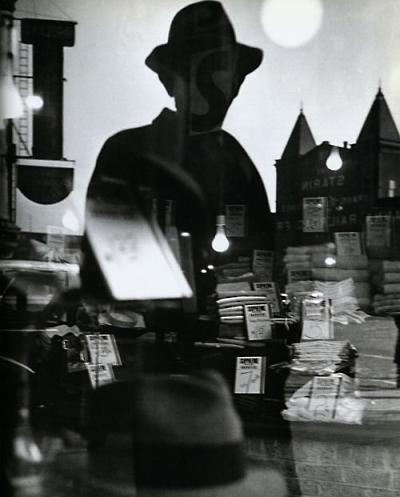
New York, 1939-1940
Lisette Model
via (OvO)
_______________________
The Two versions of the Imaginary
Maurice Blanchot, The Space of Literature
But what is the image? When there is nothing, the image finds in this nothing its necessary condition, but there it disappears. The image needs the neutrality and the fading of the world; it wants everything to return to the indifferent deep where nothing is affirmed; it tends toward the intimacy of what still subsists in the void. This is its truth. But this truth exceeds it. What makes it possible is the limit where it ceases. Hence its critical aspect, the dramatic ambiguity it introduces and the brilliant lie for which it is reproached. It is surely a splendid power, Pascal says, which makes of eternity a nothing and of nothingness an eternity.
The image speaks to us, and seems to speak intimately to us of ourselves. But the term "intimately" does not suffice. Let us say rather that the image intimately designates the level where personal intimacy is destroyed and that it indicates in this movement the menacing proximity of a vague and empty outside, the deep, the sordid basis upon which it continues to affirm things in their disappearance. Thus it speaks to us, a propos of each thing, of less than this thing, but of us. And, speaking of us, it speaks to us of less than us, of that less than nothing that subsists when there is nothing.
The gratifying aspect of the image is that it constitutes a limit at the edge of the indefinite. This fine line does not hold us at a distance from things so much as it preserves us from the blind pressure of this distance. Thanks to the image, the remove is at our command. Because of the inflexibility of the reflection, we think ourselves masters of absence which has become interval, and the dense void itself seems to open onto the radiance of another day.
...(more)
_______________________
Suffocated Desire, Or How The Cultural Industry Destroys The Individual: [pdf]
Contribution To A Theory Of Mass Consumption
Bernard Stiegler
translated by Johann Rossouw
Parrhesia
Issue 13, 2011
_______________________
Four Poems
Brent Armendinger
conjunctions
The Flight Cage
After so many years of abbreviated sky, the new bird
is cast from the bars of its former cage.
What’s left of the aviary is the no longer boy,
a soldier unable to exit a door he never entered.
He drops off the kids, puffs out his little adopted cloud
into Nevada. Some of it stays inside him,
the hugely never of Nevada. The lattice
between the species begins to curve.
...(more)
_______________________
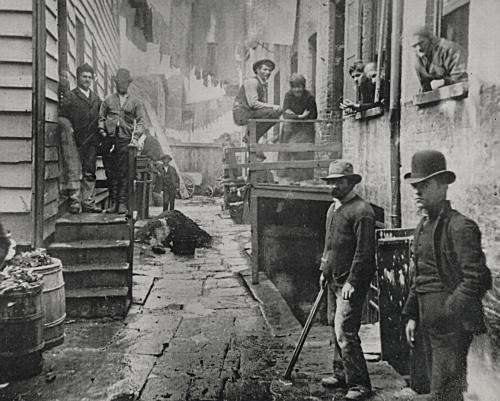
Bandits' Roost
1-2 Mulberry Street
c. 1888
Jacob A. Riis
_______________________
Upheaval as Philosophy: Eleven Theses on Guy Debord [pdf]
Richard Gilman-Opalsky
(....)
Americans in the US are especially uninterested in radical and revolutionary politics; that position is largely a result of the fact that the global crises many people worry about are still in the realm of abstraction for most Americans. Americans, for example, need to find themselves in greater imminent danger than a well-managed flurry of bovine spongiform encephalopathy (mad-cow disease) to prompt them to become vegetarians who oppose factory farming. Likewise, the “crises” of peak oil and global warming and fresh water reserves are not imminent for as long we can continue everyday life relatively uninterrupted, except by occasional worries about the abstract eventually becoming concrete. Most of the political work that takes place in between crises is preparatory, as people must be ready to act when the opportunity structure changes. We must utilize crisis theory in order to comprehend the political significance of the abstract becoming concrete. Crisis theory is necessary, but must be done without the predictive side of Marx or the indifference of Baudrillard. As much as radical philosophy can redirect attention, nobody will imagine and fight for possible futures unlike the present until the present proves its unsustainability in imminent and concrete ways.
The imminence of unsustainability is the only catalyst that lies in wait for a revolutionary politics today. The practice of radical philosophy (and situationist politics, since crisis is the ultimate situation) is limited for as long as we live in between crises. ... Left Curve
_______________________

Andreas Schelfhout
b. Feb. 16, 1787
_______________________
New life writing
Patrick F. Durgin
jacket2
(....)My remark now seems explicitly to have stemmed from my obsession with the dialectic between overt motivation (e.g. modeling Buddhist values) and nonintentionality (e.g. procedural composition and “chance operations”). For Mac Low, a primary motivation was to evacuate from the writing process the traces of ego associated with Kantian “taste,” where taste acquires predicative value. As when living life to death, one can’t really hypothesize about the results of composition except quantitatively, never qualitatively. And Mac Low was adamantly interested in poetic quality, prosodic features, aesthetic effects. He sought to make a “thing of beauty,” as his final poetics statement makes abundantly clear. Tardos was right to make Thing of Beauty the title of his posthumous selected works (published five years after his passing, in 2009, by University of California Press), because in his lifetime he had so steadily, thoroughly, and variously disproven Kant’s categorical imperative that he could finally enjoy beauty for what it’s actually worth. And what is that? It must have something to do with the procreative capacity of interpretation, which Mac Low was ever more willing to indulge and affirm. As he put it during an (unpublished) interview I conducted with him in April 2001, “any good performer is … making the work each time, they’re always doing making.” I countered that “many people would call that interpretation.” “I know,” he replied, “That seems to me denigrating the work of the performer, in a sense. I was just listening to Beethoven played by Brendel, and it’s obviously a whole other way of thinking about the pieces, the same tempo marks and that.”
These remarks very near the end of Mac Low’s working life deserve comparison to those from the outset. ...(more)
|

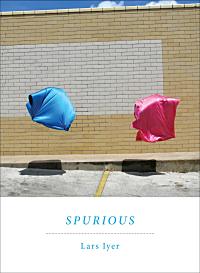


 The Age of Briggs & Stratton
The Age of Briggs & Stratton






























